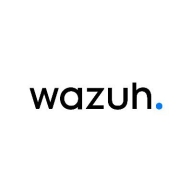

SolarWinds Security Event Manager and Wazuh are both highly regarded in the security event management category. SolarWinds has the advantage in terms of extensive features like NTA, NPM, and robust log monitoring. However, Wazuh stands out for its flexibility as an open-source solution, making it appealing to budget-conscious users.
Features: SolarWinds offers robust log monitoring, reporting, and alerting, supporting hybrid deployments across multiple platforms with features like Network Traffic Analysis (NTA) and Network Performance Monitor (NPM). It excels in providing visibility into attempted and failed logins, along with effective IP address management. Wazuh's strengths lie in its open-source adaptability, including compliance management, threat detection, and the ability to seamlessly integrate with cloud applications. It features an attractive dashboard and file integrity monitoring, with enhanced endpoint security monitoring capabilities.
Room for Improvement: SolarWinds is often critiqued for complex customizations, scalability issues, and a less intuitive interface that complicates troubleshooting. Users report performance concerns, impacting overall usability. Wazuh faces scalability challenges and lacks native threat intelligence integration, requiring improvement in AI functionalities, cloud integration, and its alerting system.
Ease of Deployment and Customer Service: SolarWinds supports hybrid deployments and receives mixed reviews on customer service, with noted issues regarding response times. Wazuh leverages its open-source model for competitive hybrid and cloud deployment, though it encounters integration challenges. Both offer competent technical support, yet SolarWinds users might experience assistance delays.
Pricing and ROI: SolarWinds is competitively priced for those seeking packaged solutions, offering attractive renewals and licensing models. It's better suited for organizations looking for a comprehensive security package. Wazuh, open-source with minimal licensing fees, is ideal for smaller organizations or budget-conscious customers, utilizing community support for cost-effectiveness.
| Product | Market Share (%) |
|---|---|
| Wazuh | 8.3% |
| SolarWinds Security Event Manager | 0.8% |
| Other | 90.9% |

| Company Size | Count |
|---|---|
| Small Business | 19 |
| Midsize Enterprise | 3 |
| Large Enterprise | 7 |
| Company Size | Count |
|---|---|
| Small Business | 27 |
| Midsize Enterprise | 15 |
| Large Enterprise | 8 |
When TriGeo was acquired by SolarWinds, TriGeo SIM became known as SolarWinds Log & Event Manager. This product is a leading Security Information and Event Management (SIEM) product and log management solution, which provides log collection, analysis, and real-time correlation.
Wazuh offers an open-source platform designed for seamless integration into diverse environments, making it ideal for enhancing security infrastructure. Its features include log monitoring, compliance support, and real-time threat detection, providing effective cybersecurity management.
Wazuh stands out for its ability to integrate easily with Kubernetes, cloud-native infrastructures, and various SIEM platforms like ELK. It features robust MITRE ATT&CK correlation, comprehensive log monitoring capabilities, and detailed reporting dashboards. Users benefit from its file integrity monitoring and endpoint detection and response (EDR) capabilities, which streamline compliance and vulnerability assessments. While appreciated for its customization and easy deployment, room for improvement exists in scalability, particularly in the free version, and in areas such as threat intelligence integration, cloud integration, and container security. The platform is acknowledged for its strong documentation and technical support.
What are the key features of Wazuh?In industries like finance, healthcare, and technology, Wazuh is utilized for its capabilities in log aggregation, threat detection, and vulnerability management. Companies often implement its features to ensure compliance with stringent regulations and to enhance security practices across cloud environments. By leveraging its integration capabilities, organizations can achieve unified security management, ensuring comprehensive protection of their digital assets.
We monitor all Security Information and Event Management (SIEM) reviews to prevent fraudulent reviews and keep review quality high. We do not post reviews by company employees or direct competitors. We validate each review for authenticity via cross-reference with LinkedIn, and personal follow-up with the reviewer when necessary.